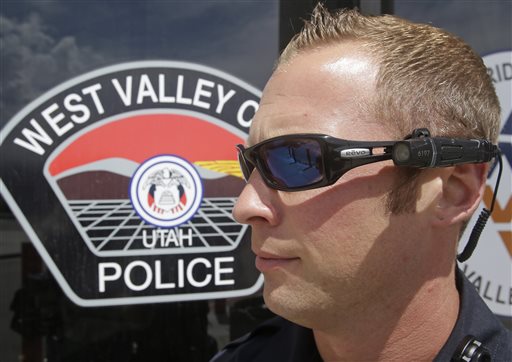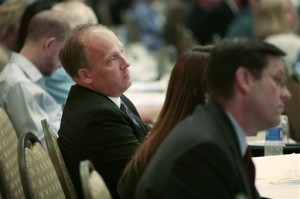Media advocates: Law doesn’t need changes for body cameras (UPDATE)
By: Associated Press//July 29, 2015//
Media advocates: Law doesn’t need changes for body cameras (UPDATE)
By: Associated Press//July 29, 2015//

By TODD RICHMOND
Associated Press
MADISON, Wis. (AP) — Wisconsin’s open records law doesn’t need a substantial rewrite to address police body camera videos, media advocates argued at a state Department of Justice summit on the statutes Wednesday.
The meeting brought local government officials to Madison’s Concourse Hotel to discuss whether the law needs updating. The gathering came just weeks after Republicans on the Legislature’s budget committee voted to make nearly all state and local government records secret earlier this month. Part of the plan called for closing to the public documents concerning drafting of legislation, electronic communications and any materials determined to be part of the “deliberative process” of crafting bills.
The moves created a bipartisan outcry and the GOP quickly backed off, but open government advocates are still worried that legislators will try to scale back the law.

The DOJ summit was scheduled well before the committee vote, and Republican Attorney General Brad Schimel, who runs the agency, spoke out against the budget committee’s restrictions. Still, the summit’s goal is to generate recommendations for lawmakers as they study the issues in the coming months.
Schimel began the meeting Wednesday by asking a panel for their thoughts on whether the open records law should be changed to require certain images to be withheld, such as those that show dead bodies, depict nudity, show the interiors of private homes, include profanity or identify victims, witnesses and bystanders.
“There’s no guidance about what must be recorded, what isn’t recorded,” Schimel told reporters. “There’s no guidance as to whether a citizen, a victim, a witness, a bystander, whether they have any right to object to their private information now becoming public information.
James Friedman, a media law attorney who sits on the Wisconsin Newspaper Association Foundation’s board, stressed that the law presumes all records are open to the public regardless of whether they exist on paper or on video.
He said the law already allows record custodians to make redactions by applying a balancing test that weighs the public interest against privacy concerns, he said. If lawmakers do anything to the law, they should clarify exactly what police records are open to the public, he said.
Jeff Mayers, president of WisPolitics.com, a political news website, echoed Friedman. He said reporters can accept judicious redactions.
Samuel Hall, Jr., an attorney who specializes in defending police officers in civil lawsuits, countered that local governments would encounter pushback from records requestors if they edited out faces and statements. He said the law needs language that lets police decide when to turn their cameras off, such as during an interview with a confidential informant. He also questioned how long police should retain videos, noting that the statute of limitations to file a lawsuit is six years.
Jill Karofsky, administrator of the DOJ’s Office of Crime Victim Services, said releasing victims’ identities and statements through videos can embarrass them and foster fears of retaliation. That could lead to fewer victims reporting crimes, she warned.
Schimel can’t pass any laws himself — that’s the Legislature’s job — but he can lobby lawmakers to make specific changes. Asked after the panel broke up exactly how the open records law should address body cameras, he said only that he wants more guidance for police.
“We have a long way to go before we determine where the lines are between what is necessary monitoring of government activity and necessary protection of privacy rights of citizens,” the attorney general said.
Schimel also briefly addressed whether he believes drafting files of legislation should remain open to the public in the wake of the budget committee’s vote but his remarks were vague. He told reporters that he believes the open records law could be changed to allow government officials to exchange ideas before releasing a final public document. Legislators would have to decide exactly how to craft such revisions, he said.
The liberal Center for Media and Democracy is suing Gov. Scott Walker to obtain documents related to his budget proposal to eliminate the University of Wisconsin’s mission statement, known as the Wisconsin Idea. Walker has argued the files are part of the deliberative process and should be kept private, an exemption not currently allowed. The DOJ isn’t representing Walker in that case. Follow @trichmond1
Legal News
- Wisconsin joins Feds, dozens of states to hold airlines accountable for bad behavior
- Trump ahead of Biden in new Marquette poll
- Bankruptcy court approves Milwaukee Marriott Downtown ‘business as usual’ motion
- New Crime Gun Intelligence Center to launch in Chicago
- Arrest warrant issued for Minocqua Brewing owner who filed Lawsuit against Town of Minocqua
- Wisconsin Supreme Court justices question how much power Legislature should have
- Milwaukee’s Common Council now has the most African Americans, women and openly LGBTQ members ever
- Office of School Safety Provides Behavioral and Threat Assessment Management Training Ahead of 25th Anniversary of Columbine Shooting
- Wisconsin Supreme Court to hear arguments in Democratic governor’s suit against GOP-led Legislature
- Lawsuit asks Wisconsin Supreme Court to strike down governor’s 400-year veto
- Wisconsin man pleads not guilty to neglect in disappearance of boy
- ACS Selects University of Wisconsin Law School’s Miriam Seifter for 2024 Ruth Bader Ginsburg Scholar Award
WLJ People
- Power 30 Personal Injury Attorneys – Russell Nicolet
- Power 30 Personal Injury Attorneys – Benjamin Nicolet
- Power 30 Personal Injury Attorneys – Dustin T. Woehl
- Power 30 Personal Injury Attorneys – Katherine Metzger
- Power 30 Personal Injury Attorneys – Joseph Ryan
- Power 30 Personal Injury Attorneys – James M. Ryan
- Power 30 Personal Injury Attorneys – Dana Wachs
- Power 30 Personal Injury Attorneys – Mark L. Thomsen
- Power 30 Personal Injury Attorneys – Matthew Lein
- Power 30 Personal Injury Attorneys – Jeffrey A. Pitman
- Power 30 Personal Injury Attorneys – William Pemberton
- Power 30 Personal Injury Attorneys – Howard S. Sicula











